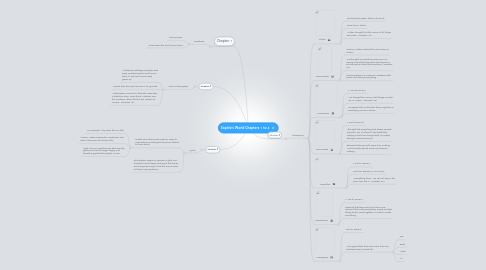
1. Chapter 1
1.1. Questions
1.1.1. Who are you?
1.1.2. Where does the world come from?
2. Chapter 2
2.1. What is Philosophy?
2.1.1. A hobby for intelligent peoples who enjoy questioning the world as we know it, and have never truely grown up.
2.1.2. Cannot take the world we live in for granted.
2.1.3. "Philosopher's search for the truth resembles a detective story. Some think Anderson was the murderer, others think it was Nielsen or Jensen" (Gaarder, 15).
3. Chapter 3
3.1. Myths
3.1.1. Greeks and others used myths in order to understand something that was too difficult to learn about.
3.1.1.1. For example: Why does the rain fall?
3.1.1.2. Answer: Water evaporates, condenses, and when it becomes too heavy, falls.
3.1.1.3. Myth: The rain goddess was abducted by giants and was no longer happy, and therefore granted the people no rain.
3.1.2. Philosophers began to question Myths and therefore had to begin looking at the stories and using reasoning to find the true answers to these crazy questions.
4. Chapter 4
4.1. Philosphers
4.1.1. Thales
4.1.1.1. The first philosopher that we know of.
4.1.1.2. Came from Miletus.
4.1.1.3. "Thales thought that the source of all things was water" (Gaarder, 34).
4.1.2. Anaximander
4.1.2.1. Lived in Miletus at about the same time as Thales.
4.1.2.2. "He thought our world was only one of a myriad of worlds that evolve and dissolve in something he called the boundless" (Gaarder, 34).
4.1.2.3. The boundless is an unknown substance that creats and distroys everything.
4.1.3. Anaximenes
4.1.3.1. c. 570 to 526 B.C.
4.1.3.2. "He thought the source of all things must be 'air' or 'vapor'" (Gaarder, 35).
4.1.3.3. He agreed with Thales that there might be an underlying source in nature.
4.1.4. Parmenides
4.1.4.1. c. 540 to 480 B.C.
4.1.4.2. "thought that everything had always existed" (Gaarder, 35). This lead to the belief that nothing could ever change itself, no matter what your senses told you.
4.1.4.3. Believed nothing could come from nothing. And that nothing that exists can become nothing.
4.1.5. Heraclitus
4.1.5.1. c. 540 to 480 B.C.
4.1.5.2. Was from Epheus in Asia Minor.
4.1.5.3. "'Everything flows... we cannot step in the same river twice'" (Gaarder, 36).
4.1.6. Empedocles
4.1.6.1. c. 490 to 430 B.C.
4.1.6.2. Believed that there was more than ONE element that made everything, simply mulitple things had to work together in order to create something.
4.1.7. Anaxagoras
4.1.7.1. 500 to 428 B.C.
4.1.7.2. Also agreed that there was more than one substance that created life.
4.1.7.2.1. Fire
4.1.7.2.2. Earth
4.1.7.2.3. Water
4.1.7.2.4. Air
